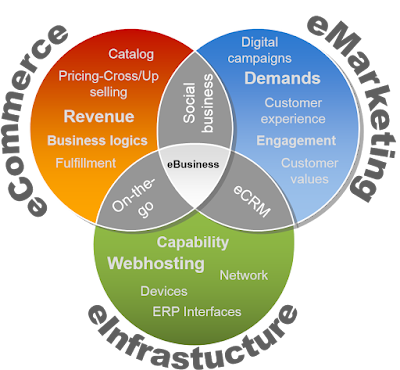Chapter 2- IDENTIFYING COMPETITIVE ADVANTAGE
What is competitive advantage?
- A product or services that an organization’s customers place a greater value on than similar
offerings from a competitor
offerings from a competitor
- Unfortunately, CA is temporary because competitors keep duplicate the strategy.
- Then, the company should start the new competitive advantage.
MICHAEL PORTER'S Five Forces Model is useful tool to aid organization in challenging decision whether to join a new industry or industry segment.
1. Buyers
- Buyers here means BUYER POWER
- it HIGH when buyers have MANY choices of whom to buy
- become LOW when their choices are FEW.
- To reduce buyer power( and create competitive advantage), an organization must make it more attractive to buy from the company not from the competitor
- Best practices of IT-based
-LOYALTY program in travel industry
e.g: rewards on free tickets or hotel stays
The Competitive Enviroment
Bargaining Power Of Customers./ Buyer Power
- Customers can grow large and powerful as a result of their market share.
- Many choices of whom to buy from.
- Low when comes to LIMITED items
#e.g: used loyalty programs (jusco card, Tesco card, being a member to get discount)
2. Supplier Power
- HIGH when buyers have FEW choices of whow to buy from.
- LOW when their choices are MANY.
- e.g: B2B marketplace – private exchange allow a single buyer to posts it needs and then open the bidding to any supplier who would care to bid. Reverse auction is an auction format
in which increasingly lower bids.
3. Subtitute product and services
- HIGH when there are MANY alternatives to a product or services.
- LOW when there are FEW alternatives from which to choose.
- ideally, an organization would like to be on market in which there a FEW substitutes of their PRODUCT or SERVICES.
-Best practices of IT
- e.g: Electronic product – same function different brands.
The Competitive Enviroment
Treat of subtitutes.
- To the extent that customers can use different product to fulfill the same need subtitutes exist.
- e.g: electronic product -same function different brands
- Switching cost - costs can make customers reluctant to switch to another product or services
4. New Entrants
- it HIGH when it EASY for new competitor to enter a market
- LOW when there are SIGNIFICANT entry barriers to entering a market
- Entry Barriers is a product or service feature that customers have come to expect from organizations and must be offered by entering organization to compete and survive.
- Best practices of IT
- e.g: new bank must offers online paying bills, acc monitoring to compete.
The Competitive Enviroment
Treat of New Entrants
- Many treats come from companies that do not yet exist or have presence in a given industry or market
- The treat of a new entrants forces top management to monitor the trends, especially in technology, that might give rise to new competitors.
- e.g: new bank ( online paying bills,acc monitoring)
5. Competitive Rivalry
- HIGH when competition is FIERCE in a market
- LOW when competition is MORE COMPLACENT.
- Best practices of IT
-Wal-Mart and suppliers using IT - enabled system for communication and track product at
aisles by effective tagging system.
-Reduce cost by using effective supply chain.
The Competitive Enviroment
Rivalry among existing firms
- Existing competitors are not much of the threat: typically each firm has found its “niche”.
- However, changes in management, ownership, or “the rules of the game” can give rise to serious threats to long term survival from existing firms
- e.g: the airline industry faces serious threats from airlines operating in bankruptcy, who do not the debts while slashing fares against those healthy airlines who do pay on debt. (MAS & AIR ASIA)
-The Three Generics Strategies-
-3 Generic Strategy (Example)-
The Value Chains – Targeting Business Processes
- Supply Chain – a chain or series of processes that adds value to product and service for customer
- Add value to its products and services that support a profit margin for the firm
THANK YOU :)











Comments
Post a Comment